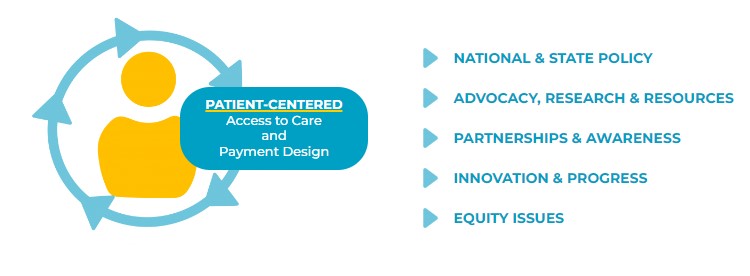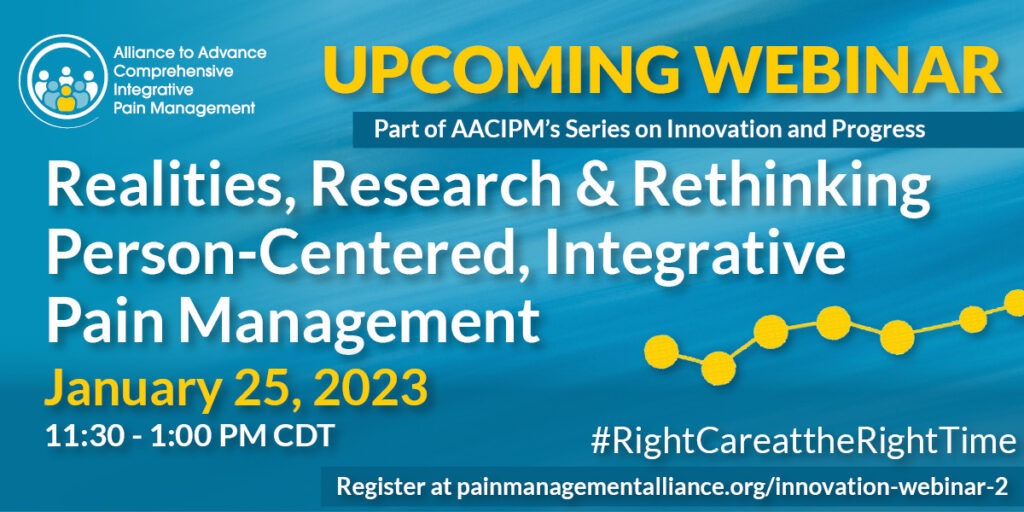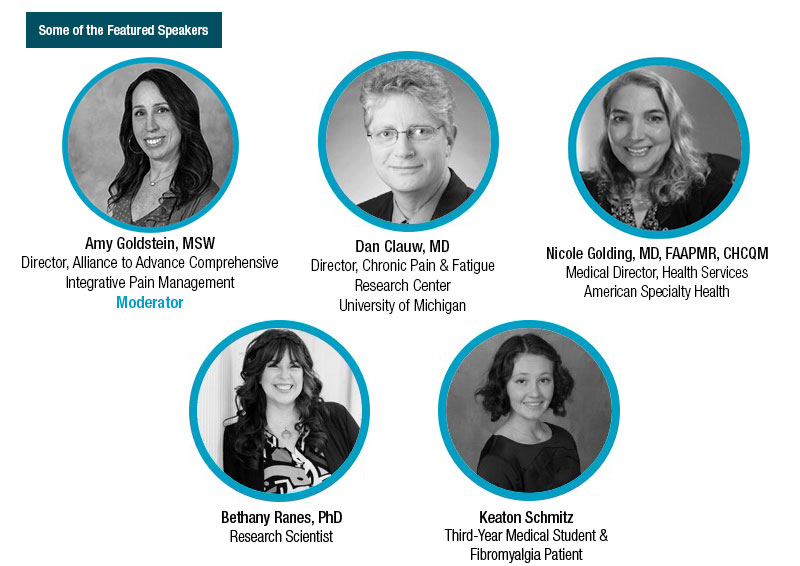 AACIPM’s 2022 Highlights
AACIPM’s 2022 Highlights
AACIPM connects multi-stakeholders with a shared interest in modifying policy and payment design to improve access to whole person, integrative pain care.

Education Opportunities

WEBINAR REGISTRATION OPEN
Realities, Research & Rethinking
Person-Centered, Integrative Pain Management
Wednesday, January 25, 2023, 11:30-1:00PM CDT
Most stakeholders agree that a person-centered, multimodal, integrative approach to pain care is best practice – and most clinical guidelines recommend that a non-pharmacological treatment should be tried first. Yet, this approach to care remains elusive for many people based on numerous pain realities. This webinar brings together perspectives from people with pain, research, clinical practice and payers to discuss innovation and progress in their field and how to keep people with pain at the center of this care.

Managing Pain: A Focus on Nonpharmacologic and Nonopioid Approaches
Webinar – January 9 – 11:00am-12:00pm ET
 AACIPM is proud to partner with CCO, AAPM&R, PCE and ProCE on this Opioid REMS Education Initiative.
AACIPM is proud to partner with CCO, AAPM&R, PCE and ProCE on this Opioid REMS Education Initiative.
Before escalating to opioid-based management strategies for patients with chronic pain, it is important to maximize nonpharmacologic and nonopioid approaches. In this webinar, experts will review the available nonpharmacologic and nonopioid pharmacologic approaches to pain management and provide clinical pearls for implementing them in your practice.

Integrative Pain Management Conference Call for Proposals
Submission Deadline is January 9, 2022
UVM’s Biennial Integrative Pain Management Conference is designed for healthcare professionals to learn about integrative therapies and share best practices, research, and innovations in chronic pain treatments.
Featured Speakers:
- Carmen Green MD, Dean Cuny School Of Medicine – The Genesis Of The Unequal Burden Of Pain: A Selective Review Examining Social Inequities And Unheard Voices
- Scarlet Soriano, MD, Executive Director, Duke Health And Well-Being – The Intersection Of Science And Spirituality
- Yoni Ashar, Phd, Clinical Psychologist, Neuroscientist, University Of Colorado – Pain Reprocessing Therapy
- Christine Goertz, DC, Phd, Professor, Musculoskeletal Research And Vice Chair For Implementation Of Spine Health Innovations At Duke University and Marion Couch, MD, PhD, MBA – Comprehensive & Integrative Pain Management Policy Panel
National Updates
Congress Expands Access to Non-Opioid Pain Management by Passing the NOPAIN Act
 The NOPAIN Act has been passed by Congress in a direct push to address outdated federal reimbursement policies in an effort to combat the opioid crisis through increased utilization of non-opioid pain management approaches. The new law will expand patient and provider access to FDA approved non-opioid pain management approaches in all outpatient surgical settings beginning in 2025. Further, the law requires CMS to submit a report to Congress identifying the limitations, gaps, barriers to access, or deficits in Medicare coverage or reimbursement for restorative therapies, behavioral approaches, and complementary and integrative health services that are identified in the HHS Pain Management Best Practices Inter-Agency Task Force Report (2019).
The NOPAIN Act has been passed by Congress in a direct push to address outdated federal reimbursement policies in an effort to combat the opioid crisis through increased utilization of non-opioid pain management approaches. The new law will expand patient and provider access to FDA approved non-opioid pain management approaches in all outpatient surgical settings beginning in 2025. Further, the law requires CMS to submit a report to Congress identifying the limitations, gaps, barriers to access, or deficits in Medicare coverage or reimbursement for restorative therapies, behavioral approaches, and complementary and integrative health services that are identified in the HHS Pain Management Best Practices Inter-Agency Task Force Report (2019).
HEAL Initiative Seeks to Fund the Development of Therapies and Technologies Directed at Enhanced Pain Management
 The National Institutes of Health have posted a funding opportunity which aims to support the development of therapies and technologies directed at enhanced pain management through the Small Business Technology Transfer (STTR) program. This funding opportunity is focused on applications directed at improving pain treatment, including the development of new non-addictive medications and devices and objective pain measurement. In addition, NIH is interested in new screening tools and models focused specifically on pain and development of pain therapies.
The National Institutes of Health have posted a funding opportunity which aims to support the development of therapies and technologies directed at enhanced pain management through the Small Business Technology Transfer (STTR) program. This funding opportunity is focused on applications directed at improving pain treatment, including the development of new non-addictive medications and devices and objective pain measurement. In addition, NIH is interested in new screening tools and models focused specifically on pain and development of pain therapies.
Applications will be accepted now through April 2025.
ICYMI
CMS Creates New Pain Management Codes Heeding Advice of AACIPM
 CMS has issued its finalized 2023 Physician Fee Schedule, creating, for the first time, billing codes at the federal level that are specific to the delivery of chronic pain management (CPM) services. Further, not only did CMS adopt the new CPM codes, but nearly all of the recommendations issued by AACIPM were substantially addressed within the final release. These codes (HCPCS G3002 and G3003) pertain to chronic pain lasting longer than three months and may be billed by a physician or other qualified health practitioner.
CMS has issued its finalized 2023 Physician Fee Schedule, creating, for the first time, billing codes at the federal level that are specific to the delivery of chronic pain management (CPM) services. Further, not only did CMS adopt the new CPM codes, but nearly all of the recommendations issued by AACIPM were substantially addressed within the final release. These codes (HCPCS G3002 and G3003) pertain to chronic pain lasting longer than three months and may be billed by a physician or other qualified health practitioner.
Learn more about the new codes and how AACIPM helped to shape them, and consider sharing this patient resource with any person living with pain who may be impacted by the code changes.
CDC Expands Opioid Guidance to Include Acute Pain and Additional Providers
 CDC has released its Clinical Practice Guideline for Prescribing Opioids for Pain (2022). Updated and revised, this new guidance is intended to replace the CDC’s 2016 opioid guideline. CDC has made it explicitly clear that its guideline is intended to be voluntary and not to be used as an inflexible standard of care by health systems, insurers, or legislatures.
CDC has released its Clinical Practice Guideline for Prescribing Opioids for Pain (2022). Updated and revised, this new guidance is intended to replace the CDC’s 2016 opioid guideline. CDC has made it explicitly clear that its guideline is intended to be voluntary and not to be used as an inflexible standard of care by health systems, insurers, or legislatures.
Learn more about the new guideline, how AACIPM was involved in its development, and what individual organizations have to say about the updated guidance.
Message from the Director
 It is with deep gratitude that I thank all of our dedicated advisors, partners, and collaborators from this year. Our team is so proud of our many accomplishments and hope you will take a look at our year end highlights to remind yourselves about our important work together.
It is with deep gratitude that I thank all of our dedicated advisors, partners, and collaborators from this year. Our team is so proud of our many accomplishments and hope you will take a look at our year end highlights to remind yourselves about our important work together.
We are looking forward to many exciting activities in 2023, including work with Andrew Weil fellowship alumni, new webinars and more.
Wishing all of you and your families a happy and healthy 2023!
Onward and Upward!
Amy
Relevant Reading
![]()
Is this long COVID or am I just getting older?, Fortune, December 27
Grieving With Migraines and Other Chronic Illnesses, Psychology Today, December 26
Physiotherapy for Piriformis Syndrome Using Sciatic Nerve Mobilization and Piriformis Release, Cureus, December 26
Chronic pain is an invisible disease whose sufferers are unfairly stigmatized, says doctoral student, Medical Xpress, December 23
Multimorbidity and Sickness Absence/Disability Pension in Cluster Headache Patients and Matched References: A Swedish Register-Based Study, Journal of Neurology, December 14
Veterans find drug-free pain relief with acupuncture, VA News, December 14
A Handy Lesson About Pain and the Brain in Stroke Survivors, Neuroscience News, December 13
From heart disease to IUDs: How doctors dismiss women’s pain, The Washington Post, December 13
How Yoga Can Help Manage Pain and Trauma, U.S. News & World Report, December 8
What Those With Chronic Pain and Illness Wish Others Knew, Psychology Today, December 6
Causal association of sleep disturbances and low back pain: A bidirectional two-sample Mendelian randomization study, Frontiers in Neuroscience, December 2
Novel brain imaging study seeks answers to chronic fatigue mystery, Medical Xpress, November 30
Feedback
We welcome your input! What do you like? Do you have a contribution for an upcoming newsletter? Send us your comments, suggestions, or contributions.
